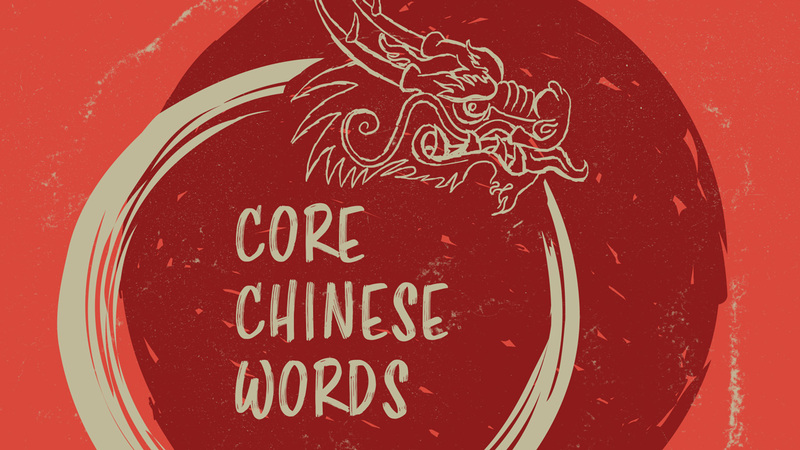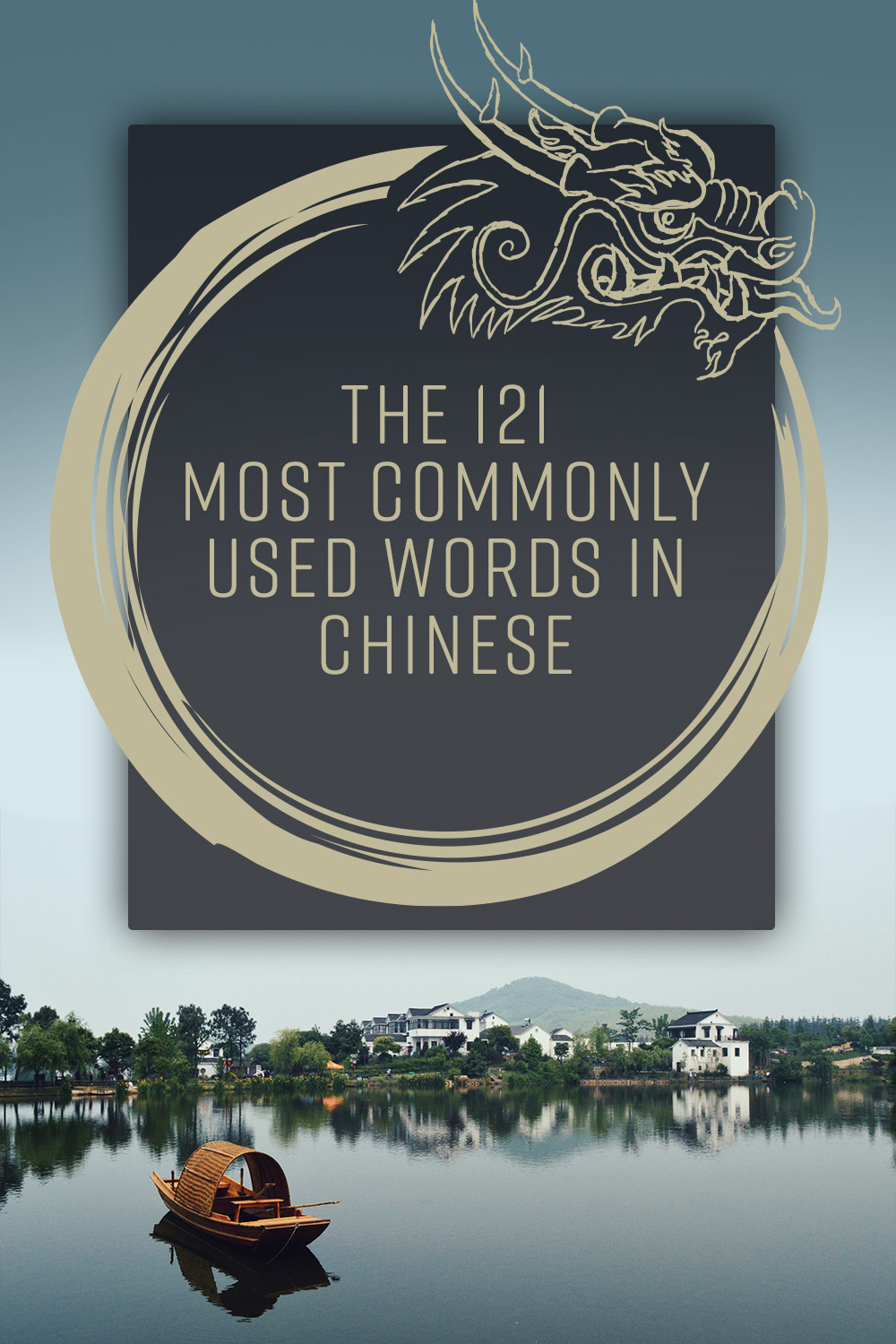121 Core Chinese Words — The Most Commonly Used Words in Mandarin Chinese
Want to understand significantly more Mandarin Chinese? With these 121 core Chinese words, you can improve your listening comprehension and speaking skills.
Sound too good to be true? Don’t worry, these 121 basic Chinese words make an appearance so often that they make up the majority of what you’ll hear in Chinese. It’s all about spending time on the most important Chinese words first.
Here at Fluent in 3 Months, we love this approach to learning new vocabulary in our languages. That’s why we’ve put together posts using this method for core Japanese words, basic Spanish words, key Italian words, important Korean words and useful French words. It’s proven to help us not only boost our listening comprehension but level up our speaking abilities, too!
It’s like learning to play an instrument. You have to learn where to put your fingers to play the notes before you can put those notes together to create music. But once you focus on figuring this out, you start being able to create music with your instrument, fast. The same is true when learning Chinese. Once you build your core vocabulary, you’ll see a huge improvement in your communication, and you’ll see it quickly.
This list isn’t an introduction to Chinese, so you’re not going to get the kinds of Chinese word lists you’d see in the first chapter of a coursebook. No classroom vocab here! Instead, you’re going to learn the Chinese words you’ll use on a day-to-day basis. And if you put this list together with these basic Chinese phrases and Chinese numbers, you might surprise yourself with just how much progress you make.
I also recommend that you continue this method past the 100 most common Chinese words to the 1000 most common Chinese words, curating the list to include the words that are most relevant to you personally. It’ll go a long way.
In general, your first 100 words in Chinese get you to about 50% fluency. Your first 1,000 words help you reach about 70%. Pretty incredible, right?
But here’s where things start to change. Everything after that first 1,000 words has a little less impact. When you get to around 10,000 words, you only add another 20% — reaching about 90% fluency. When you do the math, only 20% better fluency with 10x the vocabulary? Meh. It’s better to focus on that first important 1,000. Of course, later on, you want to get to that 10,000 words, but it just means you want to pick the right 1,000 first!
Please note that I’m not including Chinese measure words in this post. They’re important and high frequency, but they can easily take up too much of this post. For now, I just recommend learning 个 (gè). You can use it in a wide range of cases, and even if you don’t know the “correct” measure word, you can use 个 and people will understand what you mean.
I’m writing the words in this list in both Chinese characters and pinyin, that way you can focus your attention on the vocabulary itself and not the writing system, for now. It’s important to learn to read and write in Chinese, but it’s not the focus of this article.
Before we get into the article, if you are interested in learning Chinese yourself, you should check out my absolute favourite resource for learning Chinese, ChineseClass101.
Every time I refresh my Mandarin, this has been by far my favourite resource, since it’s a podcast style learning resource that covers many aspects of the language much better than traditional courses do.
It also tackles the issue of listening comprehension better than literally anything else out there, since its catalogue of lessons eases you in with simple lessons at first that get progressively harder, and you can listen to them for a huge range of topics better suited to your hobbies and interests.
They have a free option for anyone who wants to test them out, based on just their limited recent episodes, but exclusively for Fi3M readers, you can get 20% off if you sign-up for any of their subscriptions, which allow you to access their full catalog of many hundreds of lessons, using the code FLUENT3.
I highly recommend this to all Chinese learners!!
15 Core Chinese Pronouns
Much like in Japanese and Korean, Chinese is considered a “pro-drop” language, which means it frequently omits pronouns. Still, you should learn them! This is because they’re important to use for emphasis and to make things clear.
- 我 (wǒ) – “I, me”
- 你 (nǐ) – “you”
- 您 (nín) – “you” (formal)
- 他 (tā) – “he, him”
- 她 (tā) – “she, her”
- 我们 (wǒmen) – “we, us”
- 你们 (nǐmen) – “you” (formal)
- 他们 (tāmen) – “they, them”
- 它 (tā) – “it”
- 这 (zhè) – “this”
- 那 (nà) – “that”
- 这些 (zhèxiē) – “these”
- 那些 (nàxiē) – “those”
- 自己 (zìjǐ) – “oneself, alone”
- 大家 (dàjiā) – “everyone”
5 Core Chinese Titles
To be more polite, you don’t use “you” in Chinese. Instead, you use the person’s last name and title in very formal situations, and their first name and title in slightly less formal situations. There are loads of different titles in Chinese, but here are some of the most common.
- 先生 (xiānshēng) – “mr., sir”
- 小姐 (xiǎojiě) – “miss”
- 太太 (tàitai) – “madame”, note that this is used outside of business situations only
- 老師 (lǎoshī) – “teacher”
- 醫生 (yīshēng) – “doctor”
8 Essential Chinese Question Words
- 什么 (shénme) – “what”
- 几 (jǐ) – “how many”
- 谁 (shéi) – “who”
- 什么时候 (shénme shíhòu) – “when”
- 哪里 (nǎlǐ) – “where”
- 为什么 (wèishéme) – “why”
- 怎么 (zěnme) – “how”
- 怎么样 (zěnme yàng) – “how about”
12 Important Chinese Words
Here is a selection of general words that are important to know in Chinese. It’s a mixed collection of words, but they’re all high-frequency Chinese words and incredibly useful to know.
- 不 (bù) – “not”
- 了 (le) – a marker used to denote change
- 很 (hěn) – “very”
- 的 (de) – “of”
- 还 (hái) – “still, yet, also”
- 为 (wéi) – “by, for the sake of”
- 又 (yòu) – “again”
- 从 (cóng) – “from, since”
- 再 (zài) – “again, once more”
- 这样 (zhèyàng) – “like this, that way”
- 可能 (kěnéng) – “maybe”
- 对 (duì) – “correct”, or “that’s right”
38 Basic Chinese Nouns
As a Fluent in 3 Months reader (or if you listen to the Language Hacking Podcast, you may be familiar with the methods Benny Lewis uses to speak from day one. It’s to focus on words that are what you personally use in everyday life.
The best nouns and verbs you can learn are these words. And the most effective way to do this is by creating scripts. This is my favorite method too, and it’s something I’ve used with success numerous times in the Fluent in 3 Months Challenge. And it’s something I definitely think can work for you, too.
Let’s get to the words below. They’re all Chinese words you’ll hear frequently because they’re words for things that come up constantly in conversations. They’re the Chinese nouns for time, places, getting around, people, etc. Some of these words may not be common for you personally but might be for the people you talk to, so it won’t hurt for you to learn them!
14 Chinese Words for Time
- 天 (tiān) – “day”
- 星期 (xīngqí) – “week”
- 月 (yuè) – “month”
- 年 (nián) – “year”
- 今天 (jīntiān) – “today”
- 昨天 (zuótiān) – “yesterday”
- 明天 (míngtiān) – “tomorrow”
- 小时 (xiǎoshí) – “hour”
- 分钟 (fēnzhōng) – “minute”
- 时间 (shíjiān) – “time”
- 以前 (yǐqián) – “before”
- 以后 (yǐhòu) – “after”
- 现在 (xiànzài) – “now”
- 次 (cì) – “time, occasion”
11 Chinese Words for Places
- 这里 (zhèlǐ) – “here”
- 那里 (nàlǐ) – “there”
- 地方 (dìfāng) – “place”
- 学校 (xuéxiào) – “school”
- 店 (diàn) – “shop”
- 工作 (gōngzuò) – “work”, also the verb “to work”
- 洗手间 (xǐshǒujiān) – “bathroom”
- 城市 (chéngshì) – “city”
- 国家 (guójiā) – “country”
- 中国 (Zhōngguó) – “China”
- 公司 (gōngsī) – “company”
5 Chinese Words for Things
- 东西 (dōngxī) – “thing”
- 事 (shì) – “thing, matter, circumstance”
- 家 (jiā) – “house, home”
- 车 (chē) – “car”
- 问题 (wèntí) – “question, problem”
8 Chinese Words for People
- 女人 (nǚrén) – “woman”
- 男人 (nánrén) – “man”
- 孩子 (háizi) – “child”
- 朋友 (péngyǒu) – “friend”
- 人 (rén) – “person”
- 家人 (jiārén) – “family”
- 名字 (míngzì) – “name”
- 学生 (xuéshēng) – “student”
20 Common Chinese Verbs
These are the 20 most common Chinese verbs you should know. There’s a ton you can say with just these 20 verbs, especially with verbs like 要 (yào, “to want”) and 做 (zuò, “to do, to make”).
- 在 (zài) – “located”
- 有 (yǒu) – “to have”
- 说 (shuō) – “to speak, to say”
- 要 (yào) – “to want, need”
- 会 (huì) – “to know how to”
- 及 (jí) – “to reach, to catch up”
- 能 (néng) – “to be able to”
- 可以 (kěyǐ) – “can”
- 来 (lái) – “to come”
- 等 (děng) – “to wait”
- 让 (ràng) – “to allow”
- 做 (zuò) – “to do, to make”
- 想 (xiǎng) – “to want, to wish for, to miss”
- 去 (qù) – “to go”
- 表示 (biǎoshì) – “to demonstrate”
- 看 (kàn) – “to see, to look, to watch”
- 觉得 (juéde) – “to think”
- 使用 (shǐyòng) – “to use”
- 知道 (zhīdào) – “to know”
- 没有 (méiyǒu) – “to not have, there aren’t any, haven’t done”
11 Simple Chinese Adjectives and Adverbs
Adjectives and adverbs are useful words when speaking another language because they can really add something to your communication and how in-depth you go in your conversations. Here are 11 to get you started:
- 都 (dōu) – “all”
- 大 (dà) – “big”
- 最 (zuì) – “most”
- 好 (hǎo) – “good”
- 更 (gèng) – “even more”
- 每 (měi) – “every”
- 只 (zhǐ) – “only”
- 小 (xiǎo) – “small”
- 新 (xīn) – “new”
- 已经 (yǐjīng) – “already”
- 高 (gāo) – “tall”
4 Important Chinese Prepositions
Prepositions are common in Chinese because they are used in a wide range of contexts. You’ll see them when talking about time, when talking about location, and in other situations.
- 上 (shàng) – “on, above”
- 中 (zhōng) – “center”
- 里 (lǐ) – “inside”
- 下 (xià) – “under, below”
8 Core Chinese Conjunctions and Connectors
Conversation connectors are some of the best words and phrases you can pick up in another language to quickly sound more fluent. These 8 will give you a headstart in Chinese:
- 和 (hé) – “and”
- 就 (jiù) – “then”
- 但(是) (dàn(shì)) – “but, however”
- 或 (huò) – “or”
- 因为 (yīnwèi) – “because”
- 所以 (suǒyǐ) – “so, therefore”
- 如果 (rúguǒ) – “if”
- 跟 (gēn) – “with”
Do a Lot with a Little with Your Chinese Vocabulary
You’re all set to show off your Chinese vocabulary now that you’ve made it through this list of 121 core Chinese words and phrases. Now you’re ready to move on to more advanced topics and even dive into your first Chinese language exchange.




Social